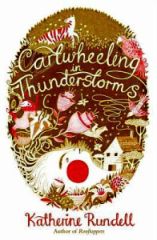Cartwheeling in Thunderstorms
 Cartwheeling in Thunderstorms
Cartwheeling in Thunderstorms
Fiction, Elementary, Middle
Simon & Schuster
August 26, 2014
256 pp.
978 1 4424 9061 1

Wilhelmina Silver's world is golden. Living ...on an African farm with her horse, her monkey, and her best friend, every day is beautiful. But when her home is sold and Will is sent away to boarding school in England, the world becomes impossibly difficult.... Where can a girl run to in London? And will she have the courage to survive?
Cartwheeling in Thunderstorms, is an engaging story of a white farm girl raised in Zimbabwe who , as an early adolescent, is sent to boarding school in England where her life is turned upside down. Katherine Rundell, the author, grew up in Zimbabwe, Brussels and London and is currently a fellow at All Souls College, Oxford University.
The main character, Wilhelmina, aka Will, is the only child of a white farm supervisor in the eastern area of Zimbabwe. Her dear friends are African Zimbabweans, also children of farm workers, and, together, they lead a carefree, happy, adventurous life in and around the farm. Her closest friend, Simon, and she ride their horses, play with monkeys, enjoy the streams and fields of this beautiful part of the country. They are “footloose and fancy free” to grow up without boundaries and without racial prejudices as young people in the new Zimbabwe. The reader experiences the joy and freedom these young people find in their world and in their friendship. Will’s life takes a change when her father dies and the man who becomes her guardian decides to re-marry. His new wife wants nothing to do with Will and sends her off to boarding school in England. It is there that she encounters rejection, humiliation and racial prejudice by young white girls.
Rundell sprinkles her narrative with touching and memorable details about life in Zimbabwe. She tells us, for example, that the curtains in Will’s room have designs of the flame lily, one of the most beautiful and common flowers growing in the country. Rundell points out that washing hung outdoors to dry must be ironed because flies may lay eggs on the wet cloth, and only a hot iron will kill them. Anyone who has lived in Zimbabwe knows that this is a fact of life. Such details bring the setting to life. They are not belabored, but simply inserted into the text as something a viewer would notice if she were there.
This story, however beautiful in its beginning, takes a wicked turn when Cynthia, the new bride of Will’s guardian arrives. She becomes the stereotypical white racist, not unlike many of the early settlers in the country. Cynthia cannot pronounce Zimbabwean names; she cannot tolerate the rough and tumble life style of Will, an independent and strong-willed girl. Cynthia is furious when Will breaks a china dish. She even sees Will as a competitor for the attention of her husband, who has known Will all her life and loves her as his own daughter. Personal relationships are especially well developed in this story and will stay with the reader long after the book is finished; many will be able to identify with similar relationships in their own lives.
Rundell uses the metaphor of the window as an effective literary device to represent Will’s outlook on life, both on the farm and at the boarding school. Young readers who are interested in creative writing and in literary techniques may find many instances of this metaphor to express feelings and desires Will experiences in her eventful life.
Although Rundell creates a “perfect” world for Will in Zimbabwe, life changes when Will moves to London. And it is here that the book goes a bit off kilter. Will sees the school, and London, as a prison. She is not accepted by the other girls and she misses her carefree life in Zimbabwe. She runs away and has frightening adventures in the city as she struggles through her attempt to go home. During these days of her escape, she spends a night in a monkey cage at the zoo, she sleeps in a tree and she eats discarded food from garbage cans; she cannot distinguish a department store from a museum. The reader could easily see these actions as one of a “wild African” girl, white or not, and assume that her life in Zimbabwe was “uncivilized” and “uncultured.” In fact, throughout the book, she is described as a wild, carefree child, so the affinity for monkeys and the ability to sleep safely in a tree, is not unexpected. These attributes, however, could be read by some as those of a typical African child, which they certainly are not.
Reviewed by Marylee Crofts, Retired Bentley University
Published in Africa Access Review (June 10, 2014)
Copyright 2014 Africa Access
